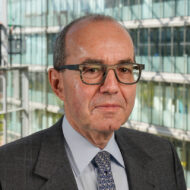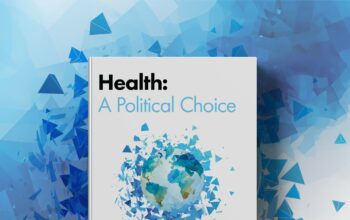Interview at The New World Model Event on the impact of COVID-19 on the future of the healthcare industry
Today I had the pleasure to participate in The New World Model, an online event on the future of industry, organised by the World Free Zones Organization.
The event seeks to explore the different angles of the new industry business models likely to emerge in a post-pandemic landscape. I was joined by executives from large global corporate groups, along with senior experts from global NGOs and multi-lateral organizations, to offer solutions and approaches to current challenges, emerging opportunities, and future threats across multiple industries and sectors.
I was invited to speak in the Healthcare Industry Panel to answer important question such as: What has changed most radically in the industry during this crisis? What is the greatest challenge to overcome in the short term? What new business models are likely to emerge? And what new opportunities will this create?
During the interview, I had a chance to reflect on the unprecedented level of collaboration that we are witnessing during this pandemic and the deep sense of responsibility shared by the biopharmaceutical industry.
What has changed most radically in the industry during this crisis?
From day one, the industry came together with the understanding that “this is not business as usual” deeply conscious of the expectations and responsibility that weighed on us because at the end of the day it is scientists, it is engineers from innovative pharma companies which have the tools to end the pandemic. And what that led to is great collaboration across and within the industry, and with academics and universities, in the form of public-private partnerships and private-private partnerships.
This was also the occasion to remind how resilient the pharma industry has been in terms of maintaining continuity of supply of non-COVID essential medicines and vaccines.
I also welcomed the opportunity to address an ongoing challenge for patients all over the world and that is the traffic of counterfeit medicines. We have heard from parts of Africa that there were problems with shortages of medicines and criminals seizing the opportunity to sell falsified medicine.
Throughout my talk it was evident that the pandemic was a call of reckoning, an awakening call for the world and for us as an industry.
What is the greatest challenge to overcome in the short term?
In the short run the biggest challenge is, on the one hand, to get an effective, high quality and safe vaccine that is developed as fast as possible, but also as slow as necessary. And on the other hand, the logistical challenge in terms of scaling up manufacturing for vaccines where you don’t know, once you take the investment decision, whether your vaccine will be effective or not.
Another area of concern is the increase in “vaccine hesitancy”. We have seen a growing distrust in vaccines and therefore we need to uphold to the highest standards because we have a tremendous responsibility.
In what region will the impact be most severe?
In the longer term, my biggest concern is in low-middle income countries where you have health systems which are inherently weak, where you do not have a strong infrastructure. Weak health systems are under tremendous strain in this crisis, and we need to show solidarity with them.
What new business models are likely to emerge in the medium to long term?
Looking into the future I think all of us need to sit down and reflect on how to better prepare for the next pandemic. When it comes to pandemic – and there may be other viruses waiting for us – we should think how can we link up, early on, with the likes of the World Health Organization and philanthropic organizations, such as the Bill and Melinda Gates foundation, the Wellcome Trust, GAVI, the global alliance on vaccines and CEPI, the coalition on epidemic preparedness. And that is exactly what we are doing as founding partners of the ACT-Accelerator, a WHO-led initiative where industry is collaborating with multilateral organisations and non-governmental organisations to speed up the discovery and production of equitable, available and affordable COVID-19 products.
So, when asked: What new opportunities will this create?
I responded that we will see more of these type of global multi stakeholder collaborations and a greater recognition that the private sector should be involved early on -with due respect to conflict of interest – because we have so much to bring to the table.
Watch full interview here
Author






